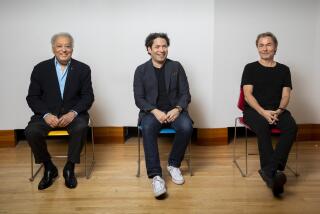MUSIC REVIEW : DICHTERS PLAY POSTPONED RECITAL
Duo-pianists Misha and Cipa Dichter turned up in Ambassador Auditorium, Pasadena, on Monday night to play the recital that had been postponed by the seismic disturbances of Oct. 1. The pairâs faithful following assembled peacefully, in gratifying numbers, to hear an enterprising program that spared neither performers nor audience.
If the presence of two pianos in one family entails any domestic strain it was not apparent in the performances. The Dichters are not exactly perfectly paired artistically but they strive earnestly to overcome certain imbalances.
They compromise on a style that is robust and emotionally forceful, well tailored technically, and sometimes rather casual as to nicety of detail.
It is often obvious that the husband commands a wider range of color and nuance than his partner but there is always unity in their aims; any feeling of competition has been carefully eliminated.
Before the evening was over they had demonstrated sufficient sensitivity, though it was not always consistent. Too often musical elegance was sacrificed to harsh tone quality, and the Ambassadorâs Hamburg Steinways did not always serve well in that respect. As usual these days, one of the instruments had to undergo servicing during intermission.
At least, thanks to the Dichters, one can boast of having heard Busoniâs two-piano arrangement of Mozartâs Fantasy in F minor for mechanical organ, K. 608. But it is not a piece that completely enhances the composerâs reputation or that offers any special opportunities to the players.
Brahmsâ orchestral version of his Variations on a Theme by Haydn, has so nearly completely supplanted its original form that it now sounds lusterless on two pianos, particularly in the placid rendering of the Dichters.
But there was nothing placid in Leonard Bernsteinâs arrangement of Coplandâs âEl Salon Mexico.â The Dichters caught its exuberance with the same verve they brought to Saint-Saensâ Scherzo, Opus 87.
The major effort of the evening was Rachmaninoffâs arrangement of his Symphonic Dances, Opus 45. This was the composerâs swan song and he went to inordinate pains and generous length to produce an exhaustive summary of his idiom. It is a sort of uninhibited retrospect of all his preoccupations, interwoven with his special brand of melancholic pessimism.
The Dichters produced it on the grand scale required to do it justice, making it the most comprehensive gesture of the program.
More to Read
The biggest entertainment stories
Get our big stories about Hollywood, film, television, music, arts, culture and more right in your inbox as soon as they publish.
You may occasionally receive promotional content from the Los Angeles Times.










